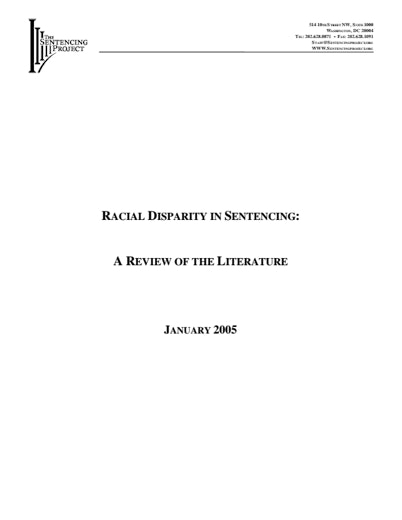The history of racial disparity in the criminal justice system in the U.S. have been longstanding. The racial dynamics in sentencing have changed over time and reflect a move from explicit racism to more surreptitious manifestations and outcomes.
In this publication, The Sentencing Project reviews the research literature of the past twenty years on racial disparity in sentencing, organizing the findings in six issue areas:
Direct Racial Discrimination
Key findings:
- There is evidence of direct racial discrimination (against minority defendants in sentencing outcomes);
- Evidence of direct discrimination at the federal level is more prominent than at the state level;
- Blacks are more likely to be disadvantaged in terms of sentence length at the federal level, whereas Latinos are more likely to be disadvantaged in terms of the decision to incarcerate;
- At the state level, both Latinos and blacks are far more likely to be disadvantaged in the decision to incarcerate or not, as opposed to the decision regarding sentence length.
Interaction of race/ethnicity with other offender characteristics
Key findings:
- Young black and Latino males tend to be sentenced more severely than comparably-situated white males;
- Unemployed black males tend to be sentenced more severely than comparably-situated white males.
Interaction and indirect effects of race/ethnicity and process-related factors
Key findings:
- Blacks pay a higher "trial penalty" than comparably-situated whites;
- Whites receive a larger reduction in sentence time than blacks and Latinos for providing "substantial assistance" to the prosecution;
- Blacks and Latinos with a more serious criminal record tend to be sentenced more severely than comparably-situated whites;
- Blacks are more likely to be jailed pending trial, and therefore tend to receive harsher sentences;
- Whites are more likely to hire a private attorney than Latinos or blacks, and therefore receive a less severe sentence.
Interaction of race of the offender with race of the victim
Key findings:
- Black defendants who victimize whites tend to receive more severe sentences than both blacks who victimize other blacks (especially acquaintances), and whites who victimize whites.
Interaction of race/ethnicity and type of crime
Key findings:
- Latinos and blacks tend to be sentenced more harshly than whites for lower-level crimes such as drug crimes and property crimes;
- However, Latinos and blacks convicted of high-level drug offenses also tend to be more harshly sentenced than similarly-situated whites.
Capital punishment
Key findings:
- In the vast majority of cases, the race of the victim tends to have an effect on the sentence outcome, with white victim cases more often resulting in death sentences;
- However, in some jurisdictions, notably in the federal system, the race of the defendant also affects sentencing outcomes, with minority defendants more likely to receive a death sentence than white defendants.
Read more
Combating Hate
Open Society’s Fight Against Antisemitism

The Soros family and Open Society have a long history of combating ethnic, religious, and racial hatred in all its forms. Our track record in tackling the scourge of antisemitism.
Roma Rights
A New Roma-led Vision of Power

The new, independent, Roma Foundation for Europe is backed by a €100 million pledge that builds on Open Society’s over 30 years of support for Roma causes.
Valuing Domestic Work
A Feminist Future of Work: Three African Feminist Leaders Revolutionizing Domestic Work

Three African feminist leaders are seeking to change the way care and domestic workers are seen and treated—pushing for policies and protections.
